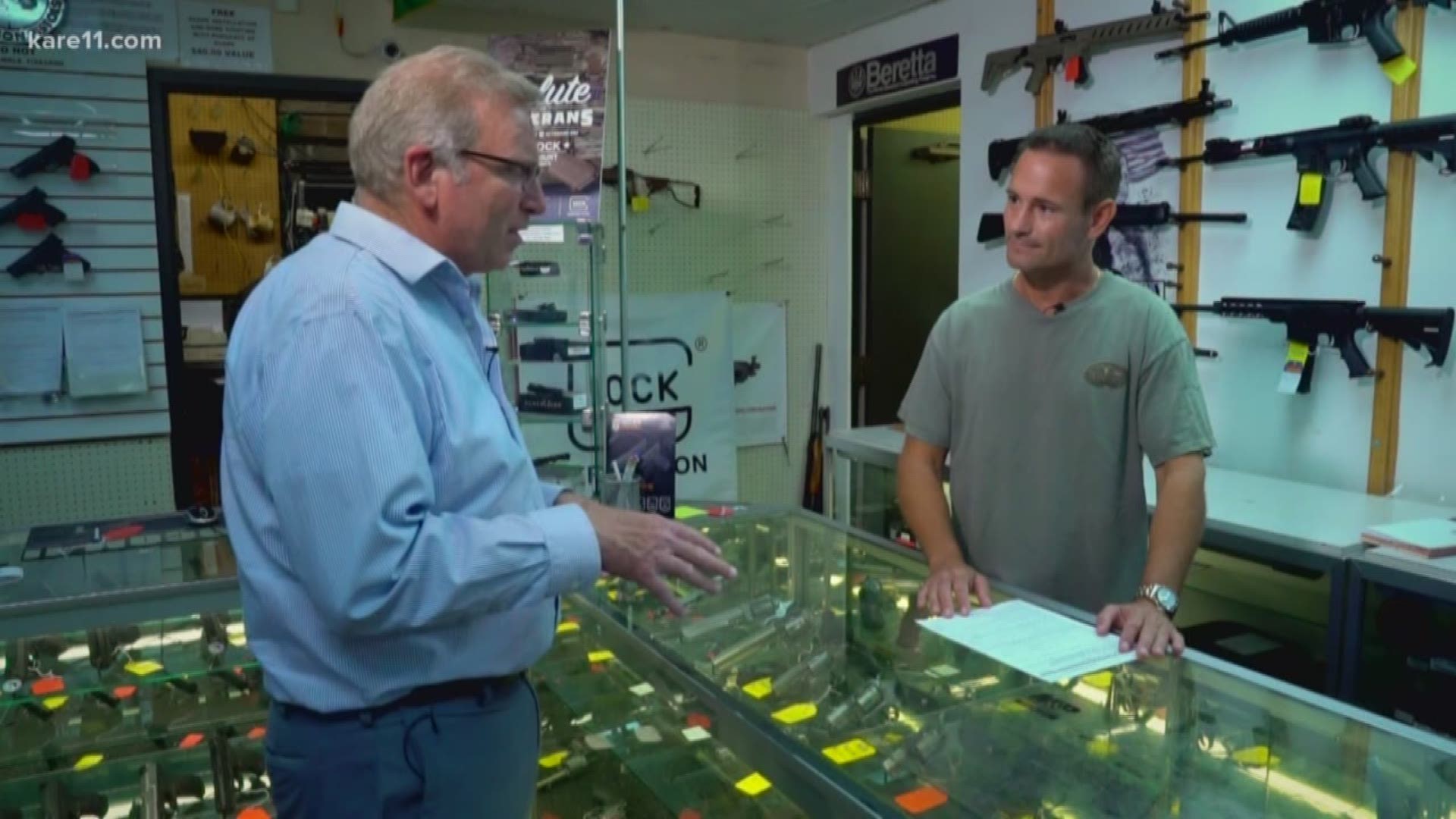MINNEAPOLIS — President Trump Friday signaled a possible break in the gun reform gridlock in the nation's Capital, suggesting Senate Republicans have had a change of heart on expanding background checks.
"I spoke to Mitch McConnell yesterday. He's totally on board," he told reporters.
"I think a lot of really meaningful things on background checks will take place, including red flags, a lot of other very, very important items."
Senate Majority Leader Mitch McConnell, who has steadfastly opposed the idea of universal background checks, didn't characterize the conversation the same way.
But with each mass shooting pressure builds on lawmakers to make some change to make sure those who are barred from owning firearms can't get them.
Currently any gun sale handled by a federally licensed firearms dealer does go through a background check, against FBI databases. The universal background checks bill already passed by the US House of Representatives would expand that to cover private sales and transfers.
The check process
Kory Krause at Frontiersman Sports in St. Louis Park walked us through the process, which begins with federal Form 4473. The form includes a series of questions designed to determine whether you're still eligible to purchase a gun.
"For example, it asks here if you use marijuana. If you say yes, we’re done!" Krause explained. "Even if you live in Colorado, if you say yes, we’re done."
Gun dealers are required to keep the form on file for 20 years so that law enforcement and the ATF can inspect it as part of investigations. Lying on the form is a federal crime.
The next step is to run your name through the FBI's National Instant Background Check System, known as NICS. It's fairly instantaneous unless the name being checked is very common.
"We can get three different responses – proceed, delay or deny," Krause explained.
"A proceed you’re instantly good to go to make the sale. With a delay they can take up to three more business days to research it and then call us back with an answer. If they don’t call us back we can still transfer the gun."
The word "transfer" is often used in firearms regulations because they cover sales and simply giving a gun to another person.
Stores are also allowed to just refuse to sell if they suspect the prospective buyer is experiencing a mental health crisis or is a straw buyer for someone who is disqualified.
"The most common one is he’s looking at guns, he’s been in here looking at guns and then it’s time he’s got this gun he wants to buy, but she’s the one who starts filling out the paperwork."
In Minnesota people who want to buy handguns or semi-automatic rifles are also required to have a carry permit from the state, or a permit to purchase issued by law enforcement.
If universal background checks become the law of the land, people who want to sell or give a gun to someone else would have to go through a licensed dealer.
"It's like when people transfer a car title and the buyer and seller are both there at counter doing that. The buyer and seller of a gun would most likely show up here together to do the paper work and get the NICS check."
Gun dealers would be allowed to charge nominal fee to cover staff time tied up by the check.
Some have said transactions between neighbors and longtime friends should be exempt, but others see the benefit of making it truly universal.
"You don't know if your neighbor has a past domestic assault conviction."
Private sales
Currently background checks are not required for private sales or other gun transfer transactions between two private individuals.
"If you went out in the parking lot and wanted to buy a gun from Joe Blow out there you could do that under the current law, without a check," Krause remarked.
"That’s one the draws at gun shows, because a good majority of the people that sell at those shows are not licensed dealers. When you’re not a licensed dealer you don’t have to do this."
Private sales done online sales would also fall under any universal background check system, but Krause said he didn't know how that would be policed.
Currently if you buy a gun online from a licensed dealer, the gun is shipped to a local shop to complete the background check. It's illegal to ship a firearm to another individual.
Beyond background checks
Third District Congressman Dean Phillips said he's cautiously optimistic there will be movement of background checks, but he sees that as a starting point to other measures to prevent mass shootings.
"I think it was a dereliction of duty for elected officials to keep ignoring this problem, but background checks are just the beginning," Rep. Phillips said, mentioning Red Flags laws, allowing the Centers for Disease Control to conduct research on gun violence.
He also said the nation needs to take a serious look at firearms and magazines that enable a person to kill a lot of people quickly.
"On background checks we’ve got to seize the moment, but we’ve also got to have a national conversation about what kind of weaponry we are willing to allow on the streets and our neighborhoods in this country."

